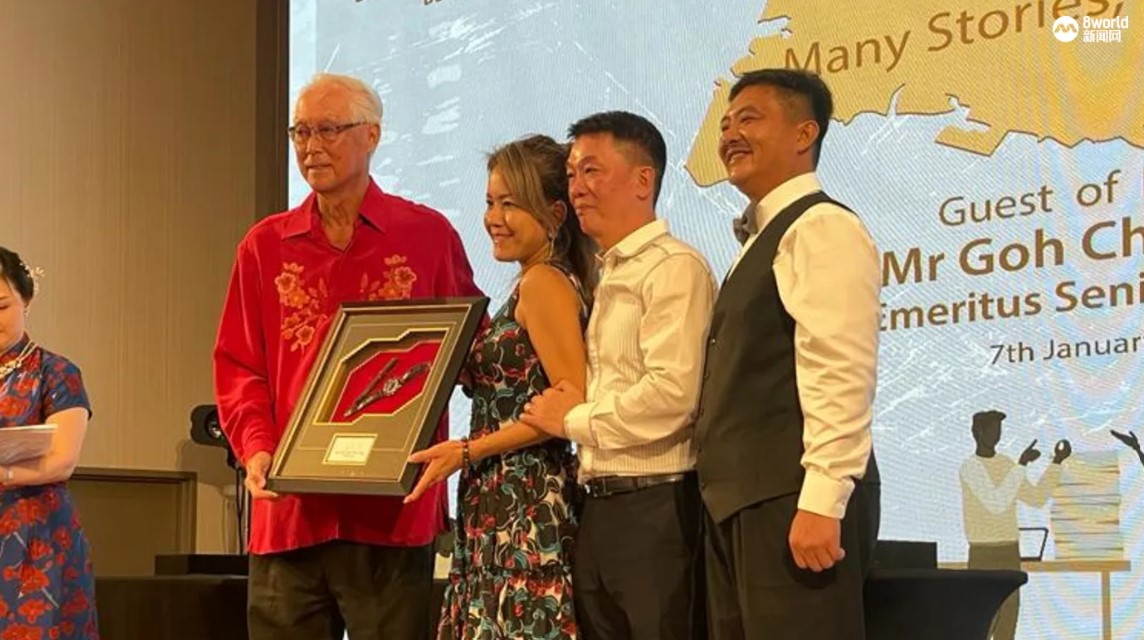
吴作栋捐出自己的手表和钢笔供竞标,两样物品最终以26万元的高价拍出,得标的是Epl Alliance Pte Ltd公司。(图:叶衍娴)
庆祝生日不忘做慈善!潮安会馆候任主席张学彬昨天(7日)庆祝46岁生日,特地举办一场盛大生日晚宴,为吴作栋协立慈善基金筹款,并邀得荣誉国务资政吴作栋担任主宾,整个晚宴总共为协立慈善基金筹得近250万元善款。
其中,吴作栋也捐出自己的手表和钢笔供竞标,两样物品最终以26万元的高价拍出,得标的是Epl Alliance Pte Ltd公司。
而印有吴作栋、社会及家庭发展部高级政务次长蔡瑞隆、国会议员陈佩玲、林谋泉和阀贺米的掌印纪念品,则拍得33万3333元3角3分的高价,由商人朱志强夫妇标得。
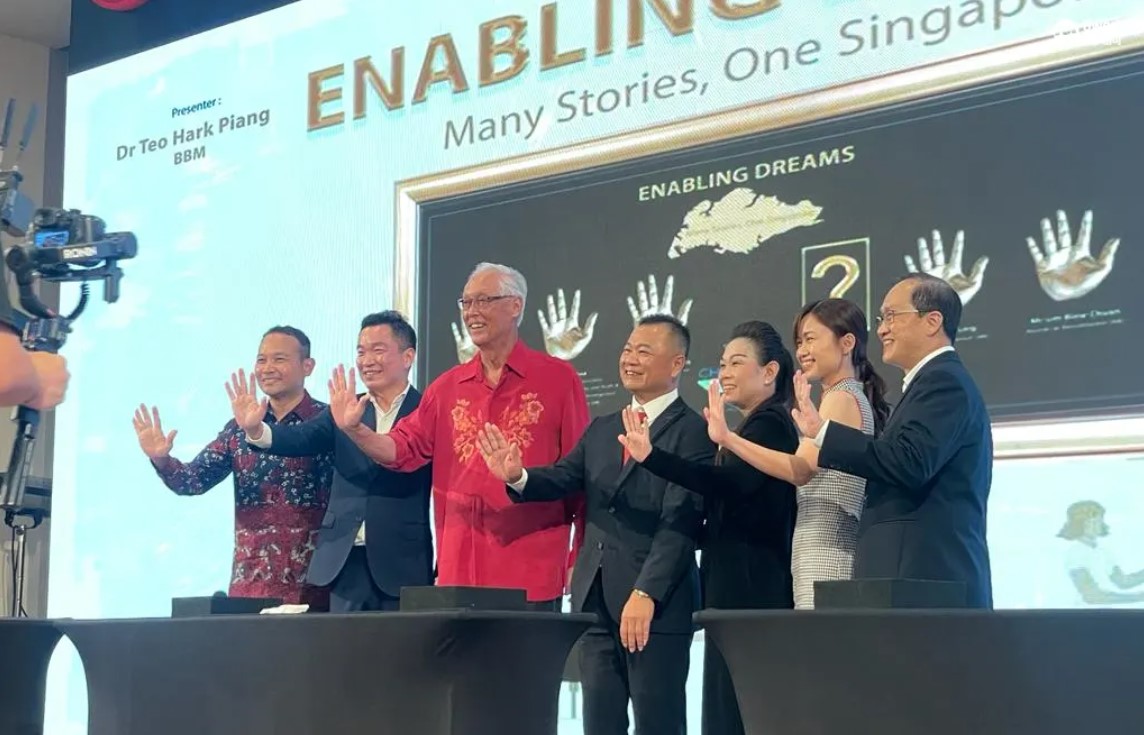
商人朱志强夫妇以33万3333元3角3分的高价标得掌印纪念品。(图:叶衍娴)
46岁的张学彬,是优联燃气控股的总裁,活跃于多个会馆社团。配合他的生日,他昨晚在醉花林俱乐部礼堂举办这场名为“实现梦想”(Enabling Dreams)的慈善晚宴。出席者除上述多个政要议员外、还包括企业家、商界领袖等“重量级”人物。
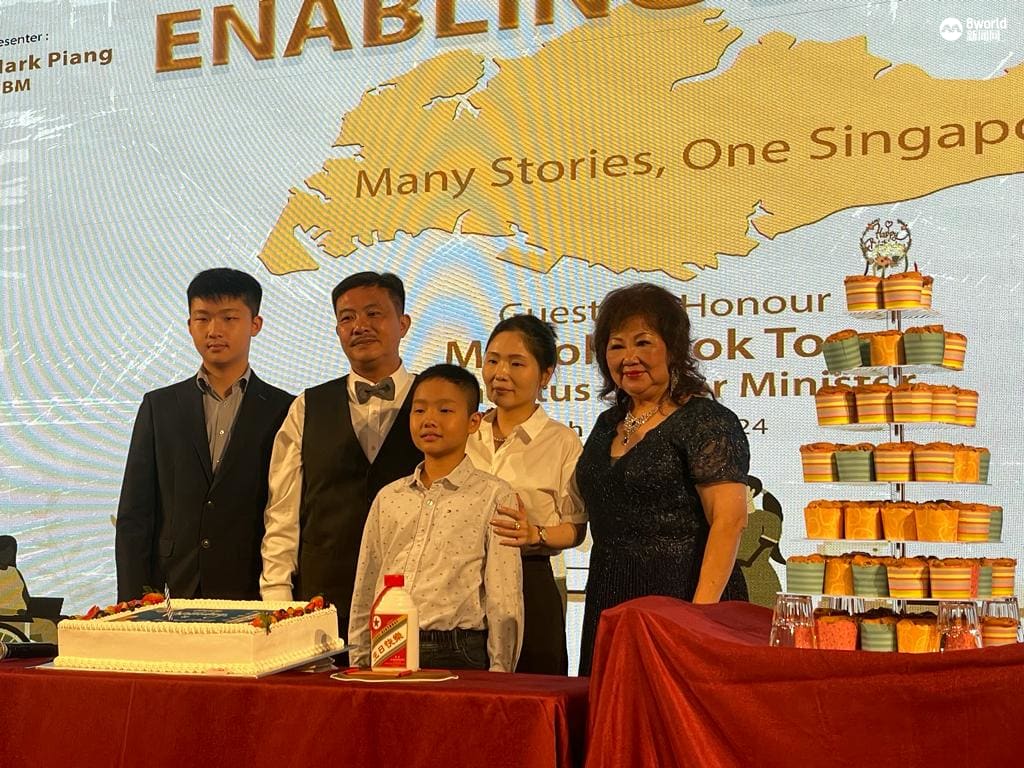
张学彬一家上台为他庆祝生日(图:叶衍娴)
张学彬接受《8视界新闻网》访问时说,昨晚的晚宴对他来说,意义非凡。他说,其实庆生是次要,更重要的是想要做一场慈善筹款活动。
“我觉得,社会上还有一些不幸群体,需要我们去帮助。生日年年有,但不是说,年年都可以去办慈善活动。很幸运的,大家都很疼爱我,一叫就来了。”
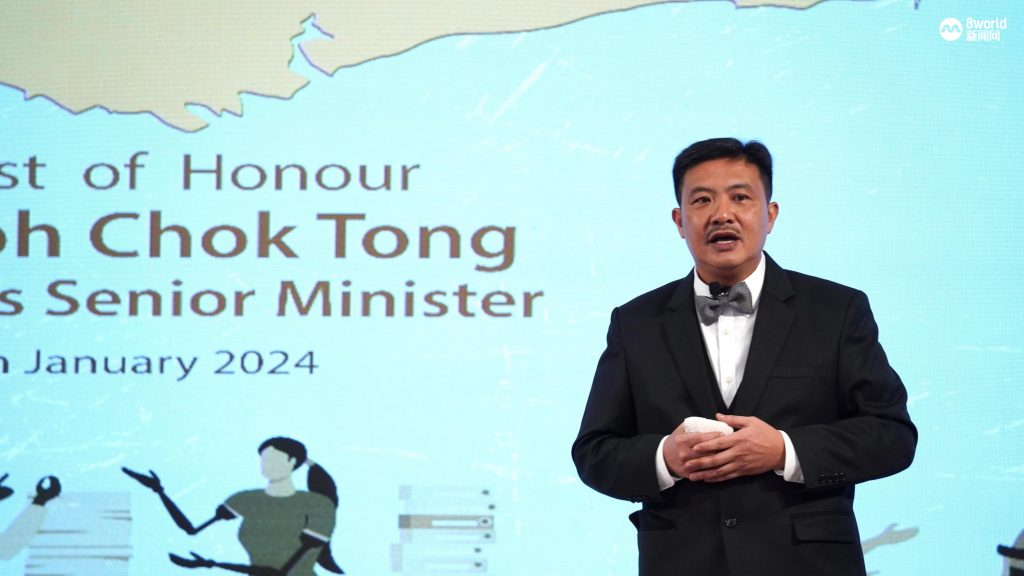
张学彬。(图:何婷婷)
张学彬说,昨晚筹到的所有善款,都将捐给吴作栋协立慈善基金,希望尽可能帮助到更多的有需要群体。
吴作栋在致辞时说,吴作栋协立慈善基金至今已发放超过500万元协助残障人士,他希望该基金是可持续性的,以便能继续为残障人士得生活带来积极得影响。
昨晚的庆生慈善活动,共进行长达四个小时,分别举行多场的慈善义标项目,在场的仁人善翁、商界人士都非常踊跃参与捐款,整个慈善晚宴最终共筹得243万8888元。
吴作栋协立慈善基金受惠者,昨晚在晚宴上也带来多项余兴节目,使得晚宴热闹精彩。
吴作栋协立慈善基金旨在为残障人士提供对社会做出贡献和融入社会的机会。基金由新协立管理,新传媒鼎力支持。荣誉国务资政吴作栋是基金的赞助人。欲通过吴作栋协立慈善基金给予残障人士支持, 请浏览 GCTEnableFund.sg。
文: 8 world 叶衍娴
987 DJ Sonia Chew spent a day getting to know Joan Hung, a Goh Chok Tong Enable Awards 2021 Promise Awardee.
Joan was born with visual impairment, but that has not stopped her from pursuing her passion for sports. She has represented Singapore in Goalball in the ASEAN Para Games in 2015 and 2022, and has even picked up Judo. Joan continues to advocate for inclusivity by giving educational talks on resilience through sports to students in schools.
You too can make a difference and support persons with disabilities like Navin by giving to the Goh Chok Tong Enable Fund at giving.sg/GCTEnableFund.
Formerly the Mediacorp Enable Fund, the Goh Chok Tong Enable Fund was renamed after its Patron, Emeritus Senior Minister Goh Chok Tong, to better reflect its roots and intent in aiding persons with disabilities to actively contribute to society and lead socially integrated lives. The Fund is administered by SG Enable, and supported by Mediacorp.
#GCTEnableFund #GohChokTongEnableFund
Oli 968 artiste Anand K spent a day with Dr Navin Nair, Goh Chok Tong Enable Awards 2022 Promise Awardee, who was diagnosed with cerebral palsy at birth.
He became a force for good, working with the Land Transport Authority and SMRT in their efforts to support persons with disabilities in navigating the public transport system.
You too can make a difference and support persons with disabilities like Navin by giving to the Goh Chok Tong Enable Fund at giving.sg/GCTEnableFund.
Formerly the Mediacorp Enable Fund, the Goh Chok Tong Enable Fund was renamed after its Patron, Emeritus Senior Minister Goh Chok Tong, to better reflect its roots and intent in aiding persons with disabilities to actively contribute to society and lead socially integrated lives. The Fund is administered by SG Enable, and supported by Mediacorp.
#GCTEnableFund #GohChokTongEnableFund
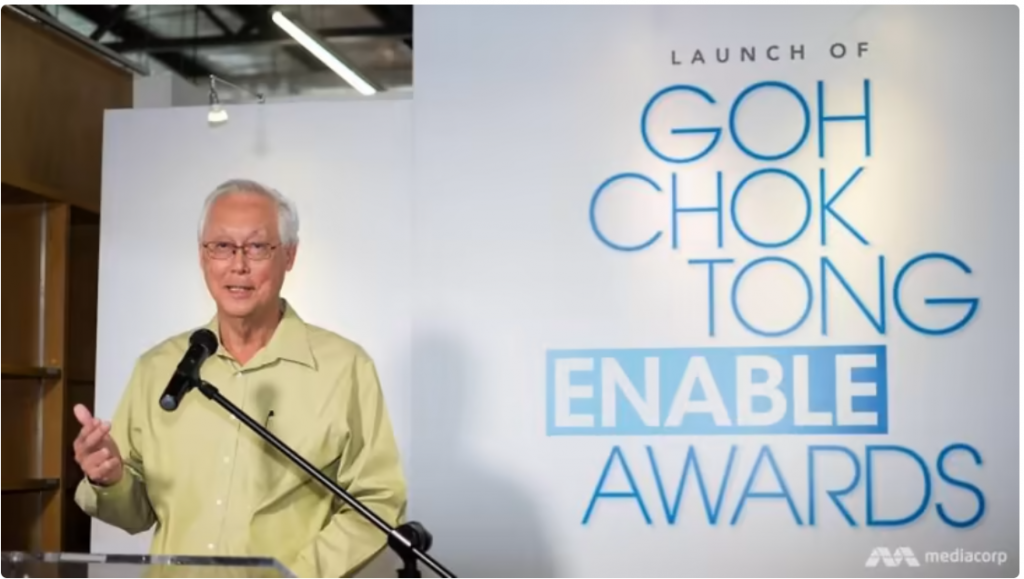
Emeritus Senior Minister Goh Chok Tong speaking at the launch of the Goh Chok Tong Enable Awards.
SINGAPORE: A fundraising campaign was launched on Monday (May 22) as part of the Goh Chok Tong Enable Fund to support people with disabilities.
Previously known as the Mediacorp Enable Fund, the campaign aims to raise awareness of the everyday challenges faced by people with disabilities.
Members of the public can contribute by taking part in “Paint It Forward” art jam sessions, which will be held at 10 malls managed by Frasers Property from May 26 to Jun 25.
“Participants will be offered opportunities to co-create art on outline canvases inspired by artists with disabilities behind the National Day Parade 2020, 2021 and 2022 collaterals, which were produced as part of the i’mable public education initiative by SG Enable,” said the Goh Chok Tong Enable Fund in a media release.
For every participant, Frasers Property Singapore will contribute S$10 to the fund.
The artworks will be pieced together to form a collage that will be displayed at Northpoint City from Jun 21 to 25.
“Our malls serve as important hubs for the community,” said CEO of Frasers Property Singapore Soon Su Lin. “Through Paint It Forward, we hope to highlight that everyone is able to support one another, regardless of abilities – and to contribute to an inclusive community and a better future together.”
A community fund administered by SG Enable, with Mediacorp as its media partner, the Goh Chok Tong Enable Fund was initiated by Emeritus Senior Minister Goh Chok Tong as the Today Enable Fund in December 2016, before being renamed as the Mediacorp Enable Fund in November 2018.
With the latest rebranding as the Goh Chok Tong Enable Fund, it aims to grow its work in providing opportunities for and supporting the aspirations of people with disabilities.
“In this, the Goh Chok Tong Enable Fund looks to provide financial assistance and helm other initiatives to complement efforts by the government and social service agencies in aiding persons with disabilities to actively contribute to society and lead socially integrated lives,” it added.
A key initiative of the fund is the annual Goh Chok Tong Enable Awards, which celebrates the achievements of people with disabilities and supports their aspirations.
This year’s awards will be held on Nov 30. Nominations for the awards are open until Jul 23.
Mediacorp celebrities will join the award winners as well as beneficiaries of the fund to put together videos on their everyday lives, accomplishments and how they overcome challenges.
These videos will be shared across the company’s media network.
“Mediacorp remains passionate in doing our part in building an inclusive society,” said Mediacorp CEO Tham Loke Keng.
“As the fund’s media partner, we will continue to leverage the reach of our platforms and talents to amplify its initiatives and work to support persons with disabilities and foster an inclusive society.”
As patron of the fund, Mr Goh said: “A kinder, gentler Singapore is one that helps persons with disabilities excel in life, at work, and in the community. As the fund evolves, we should increase our support to meet the aspirations and needs of persons with disabilities, as well as be more effective in recognising their abilities and contributions to others.”
Source: CNA/gs(mi)
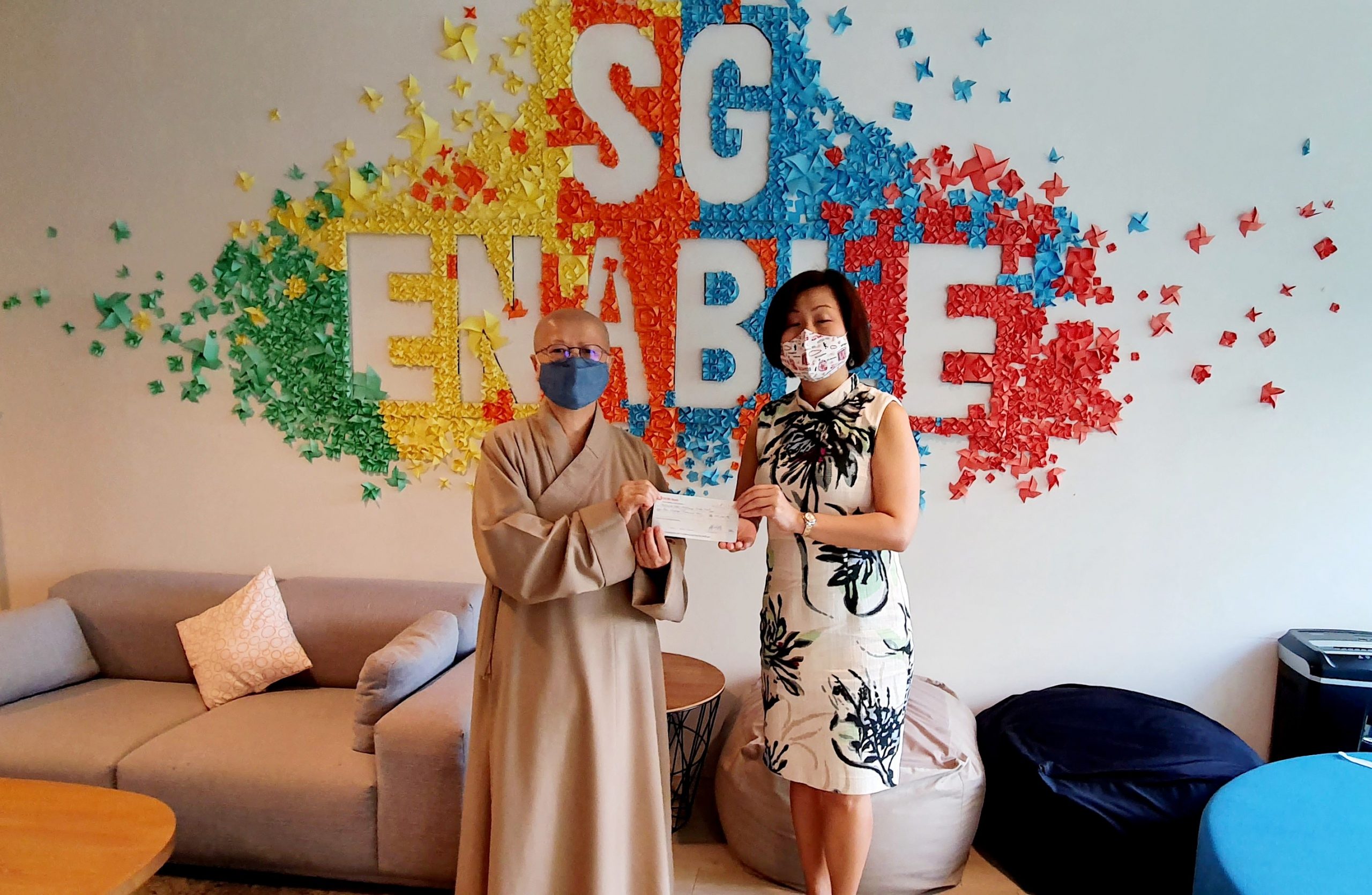 Venerable Sek Ming Woon, one of two executrices of the late Venerable Suit’s estate, presenting a S$100,000 cheque to CEO of SG Enable, Ms Ku Geok Boon
Venerable Sek Ming Woon, one of two executrices of the late Venerable Suit’s estate, presenting a S$100,000 cheque to CEO of SG Enable, Ms Ku Geok Boon
The late Venerable Suit Woo Foong was a simple man. Born in China in 1921, he became a monk when he was just 12 and lived in monasteries until he passed away at the age of 97 in 2018.
In his final years, Venerable Suit lived in Singapore’s oldest Buddhist monastery, the Lian Shan Shuang Lin Monastery.
Known to be compassionate and generous, he was dedicated throughout his life to the pursuit of the spiritual as well as the alleviation of sufferings of the physical world.
It came, then, as no surprise that he had bequeathed proceeds from the only asset he owned – a house in Telok Kurau – to several charities.
The Mediacorp Enable Fund (MEF) was one of these charities. It received S$100,000 in support of its work to build a society where persons with disabilities are recognised for their abilities and are enabled to lead full, socially integrated lives.
The donation from the estate of the late Venerable Suit will go towards funding three broad areas: Aspirations and Last Mile Needs, Transition to Work, and Community Support.
In the area of Aspirations and Last Mile Needs, individuals will be supported in skills development or with financial assistance, while organisations will be aided in the development of their talents. The Transition to Work scope provides customised training and employment programmes to smoothen transition at critical stages of life. Community Support is a three-pronged effort that supports initiatives to enhance the independence and integration of people with disabilities, offers support to caregivers, and fosters a network of Special Education (SPED) alumni so that they do not become isolated.
Said Ms Ku Geok Boon, CEO of SG Enable which administers MEF: “We are grateful for this kind donation from the estate of the late Venerable Suit Woo Foong. It is most timely as the impact of COVID-19 on persons with disabilities and their caregivers is showing to be disproportionately huge compared to other vulnerable groups. (Venerable Suit’s) generosity will enable MEF to continue extending help and relief to persons with disabilities, and encourage them to keep their faith and stay positive, knowing that the community cares for them during these difficult times.”
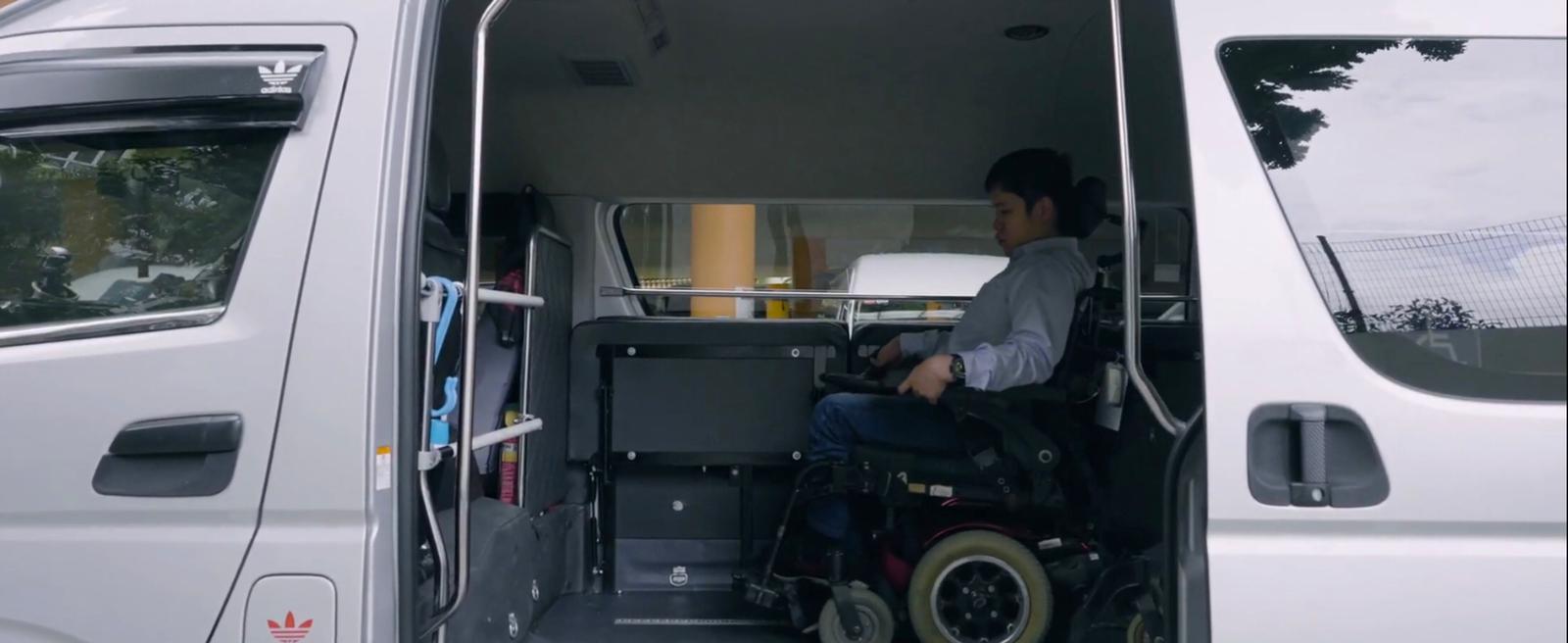 Alumni Neo Kah Whye on his way home in a hydraulic van after participating in the Hydro Weekly programme at CPAS.
Alumni Neo Kah Whye on his way home in a hydraulic van after participating in the Hydro Weekly programme at CPAS.
New support for SPED schools for continued engagement with alumni
Once a person with disability graduates from a Special Education (SPED) school, he / she may be transitioned into the workforce through programmes like the School-to-Work Transition Programme that enhances the independence and integration of the graduate.
However, such programmes currently do not include activities that help these graduates maintain the ties that they have built in school, as such bonding activities require extra resources that SPED schools do not have.
A need to support SPED school alumni networks
This is where the Mediacorp Enable Fund (MEF) comes in. MEF aims to build a society where persons with disabilities are recognised for their abilities and are enabled to lead full, socially integrated lives. SG Enable, an agency dedicated to enabling persons with disabilities, is MEF’s administrator while Mediacorp is its official media partner.
In supporting SPED schools and their networks, the community-based fund has since expanded its aid to include support for the caregivers of persons with disabilities, as well as for programmes that look to foster a network of SPED alumni so they do not become isolated.
Specifically, the MEF will support SPED schools or their parent organisations under its SPED Alumni Engagement funding for outreach programmes that encourages continued engagement by the community with their alumni networks.
On this, Ms Selina Heng, Manager of SG Enable said: “The relationships that these graduates have established in school are crucial to their overall development and it is important for them to continue to have a strong support network.”
SPED Alumni Engagement Support’s first recipient
In January 2021, MEF’s Community Fund supported Cerebral Palsy Alliance Singapore (CPAS) with S$20,000 under its SPED Alumni Engagement funding. This will go to defraying their cost of running their Beyond Boundaries Club’s weekly programmes, which include riding lessons, hydrotherapy, creative arts and music, digital art and flower design.
Ms Yurnita Bte Omar, Alumni Liaison Executive of Adult Services at CPAS said: “We are thankful to be the first recipient of MEF’s SPED Alumni Engagement funding. This will assist with the cost of running our weeklactivities, through which we hope to bridge the gap between our alumni and the community. With the funding, we also hope to reach out to more high support and home-bound alumni.”
Some 35 CPAS alumni, aged between 18 and 55, with moderate to severe physical or multiple disabilities will benefit from the funding this year.
How SPED schools can qualify for funding
SPED schools (or their parent organisations) hoping to get support for their alumni engagement initiatives can apply for the funding under two categories:
Applications that do not fall into these categories will be assessed on a case–by-case basis.
Schools can submit a proposal through their principal any time during the year but can only receive funding once every 12 months. Their proposal, complete with an application form, should map out key details such as when the activity will take place, its nature and objectives, the target number of participants as well as the budget.
Once funding has been given and the event or programme completed, a brief report of the entire proceeding needs to be submitted. Regular activities will require reports either on a quarterly, half-yearly or annual basis.
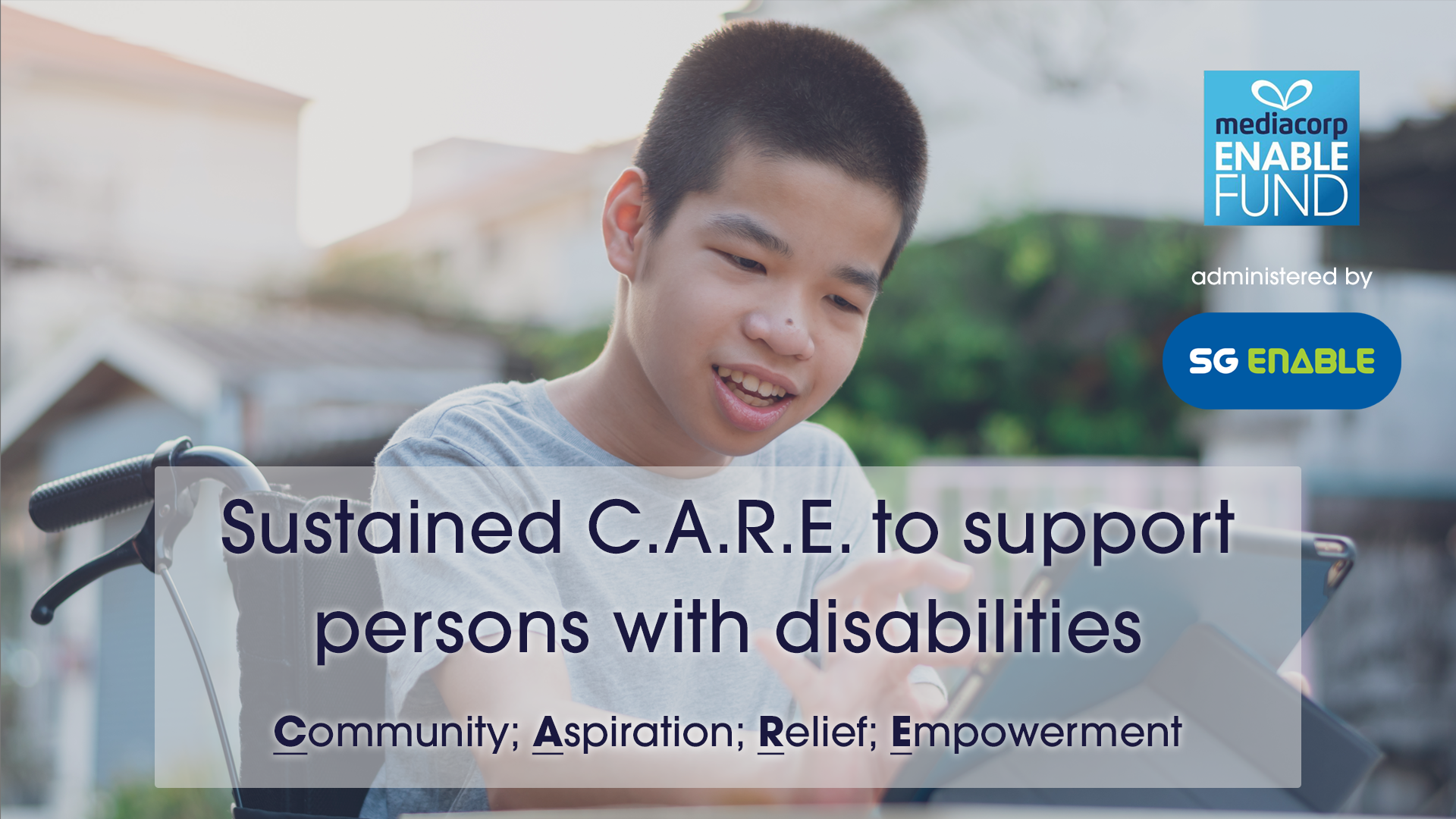
SINGAPORE: The Mediacorp Enable Fund is launching the Sustained CARE giving drive to support people with disabilities and their caregivers, who face a “disproportionately severe” impact from the COVID-19 pandemic.
“Caregivers have been under added pressure to provide for their loved ones due to adjustments that have to be made in access to rehabilitation and care services,” said the company in a media advisory on Monday (May 24).
Many people with disabilities also continue to face challenges engaging in day-to-day activities, while also being affected by job losses and slower hiring, said Mediacorp.
Contributions to the Sustained CARE giving drive can be pledged online from now until Jul 30.
Donations will be used to meet the commuting and mobility needs of people with disabilities, nurture their talents, support their education and employment needs, and give respite and support to their caregivers.
“It has been a long fight against COVID-19 for everyone, and persons with disabilities and their families continue to face greater difficulties adapting to the challenges brought about by the pandemic,” said Mediacorp CEO Tham Loke Kheng.
“We are committed to working with SG Enable to leverage the reach of our multiple platforms and influence of our talents to do our part to help this vulnerable community.
“We are also very grateful for the incredible support from donors during last year’s campaign and we hope that those who are able to will continue to give wholeheartedly and generously again this year,” said Ms Tham.
The Sustained CARE giving drive follows a previous initiative launched by the Mediacorp Enable Fund in May last year to respond quickly to the immediate needs of people with disabilities during Singapore’s “circuit breaker” period.
That initiative raised S$577,000 in just over two months, supporting 2,000 beneficiaries.
SG Enable CEO Ku Geok Boon said: “The generous donations from corporates and the public have gone a long way in providing urgent and direct support to persons with disabilities and their caregivers, particularly during the circuit breaker.
“We are thankful for the public’s generosity and Mediacorp’s continued support with this second fundraising campaign to meet the beneficiaries’ needs as they adjust to the new normal.”
The Mediacorp Enable Fund is a community fund administered by SG Enable. It aims to help build a society where people with disabilities are recognised for their abilities and lead full, socially integrated lives.
SG Enable supports the fund’s administrative functions and Mediacorp is the official media partner.
Source: CNA/dv
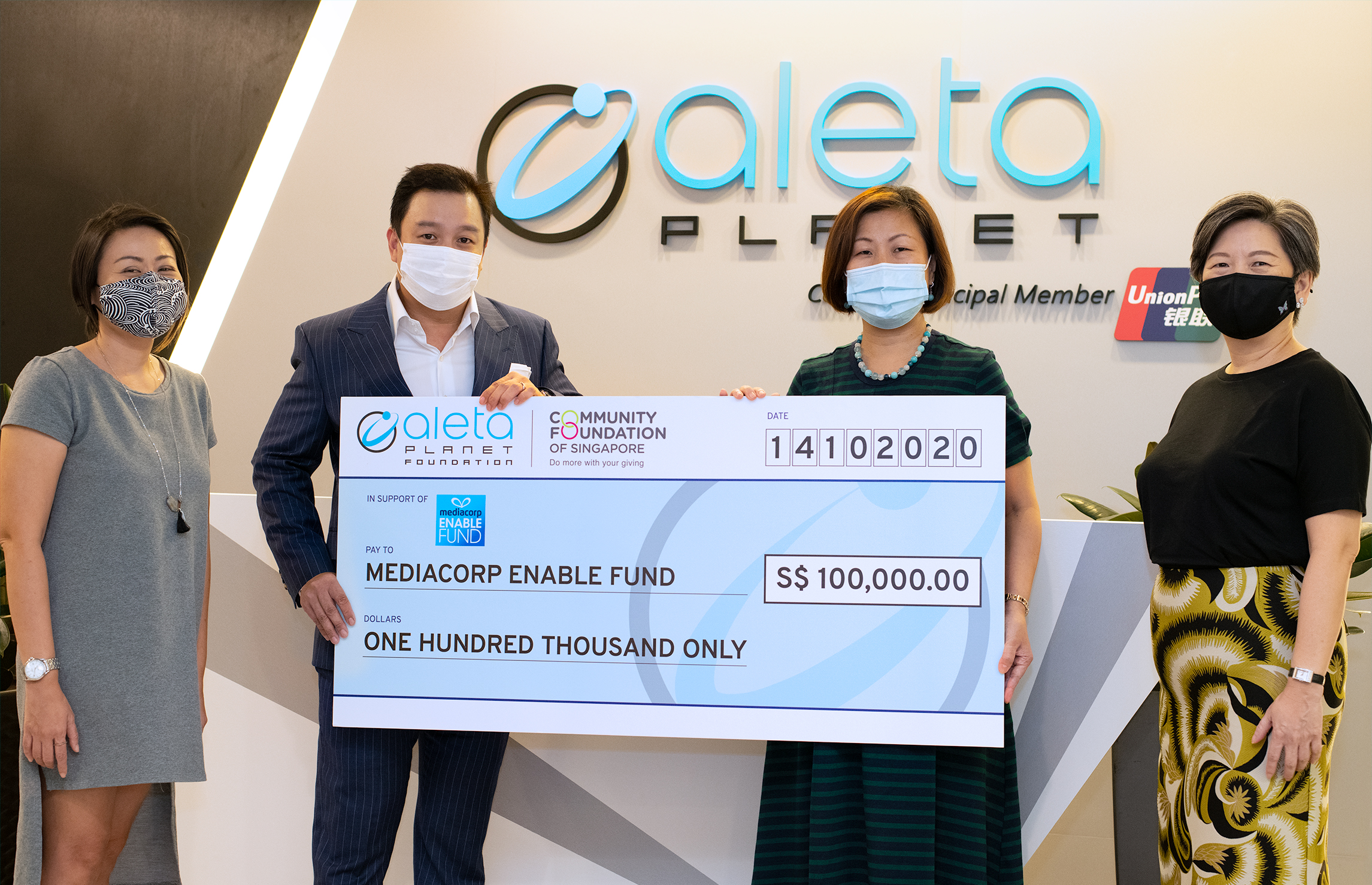
SINGAPORE: A new foundation established by Singapore-based fintech firm Aleta Planet has donated S$100,000 to the Mediacorp Enable Fund, the company said on Friday (Oct 16) in a media release.
Aleta Planet announced on Friday that the foundation will make donations to various charities, aiming to “create a positive impact on society at a time when the COVID-19 pandemic has adversely affected many livelihoods”.
It will support the needs of the elderly and children in the local community, with an initial commitment of S$200,000, said the company.
The first of such donations is S$100,000 to the Mediacorp Enable Fund, a community fund administered by SG Enable that aims to help build a society where people with disabilities, including the elderly and children, “are recognised for their abilities and are able to lead full, socially integrated lives”.
SG Enable chief executive officer Ku Geok Boon said: “We are deeply grateful to Aleta Planet Foundation for their strong spirit of charity and choosing the Mediacorp Enable Fund to make their first donation.
“The generous contribution will provide much-needed financial assistance in meeting the last mile needs of persons with disabilities, as well as to help them fulfil their aspirations in life.”
This will enable the foundation to connect with suitable charity partners as well as manage the funds it receives.
CEO of the Community Foundation of Singapore Catherine Loh said: “We look forward to closer collaboration with the Aleta Planet Foundation to identify gaps in the community so as to foster more effective giving and amplify the positive impact they have on our society.”
Aleta Planet Foundation said its support for the elderly “will go particularly towards those abandoned by their families and those having to work despite their frailties”.
It will also focus on children with disabilities and those from low-income families whose parents “have little means to help them reach their full potential”.
Aleta Planet chairman and group CEO Ryan Gwee said that contributions to the foundation will increase over time “as part of a sustainable corporate giving culture”.
“As Aleta Planet has reached a level of growth, we feel that it is now fitting for us to give back to the community in which we operate,” said Mr Gwee.
“This is especially timely amid a pandemic and recession that have created considerable hardship for the most vulnerable groups living on the fringes of our society.

From cooked meals and cash relief to the provision of essentials, a new initiative by the Mediacorp Enable Fund — a charity fund by national media network Mediacorp and SG Enable — aims to help people with disabilities and their caregivers ride out the Covid-19 pandemic.
The initiative “C.A.R.E.” — short for the provision of cooked meals, assistance funds, respite care and essentials — will be driven by public donations, Mediacorp said in a statement on Thursday (May 14) as it launched the scheme.
The funds collected from the campaign will give beneficiaries access to:
Cooked meals. These will be for persons with physical disabilities or those with visual impairment who are living alone, frail persons with disabilities and aged caregivers
A one-off cash relief of S$400 for families with multiple persons with disabilities who face financial hardship and caregiving stress. This will help the families defray the costs of daily expenses and other needs, such as medical costs
Respite care — home-based respite that provides relief for caregivers. This will minimise the risks of burnout and injury for low-income elderly carers who look after persons with disabilities round-the-clock
Fortnightly distribution of dry food rations. This will help persons with physical disabilities or those with visual impairment who are living alone, frail persons with disabilities and elderly caregivers
Mediacorp said the impact of the Covid-19 outbreak on people with disabilities and their caregivers has been “disproportionately huge”.
Those among this group who are seeking employment or are working have been hit hard, with some having lost their jobs, the company noted.
“Many have not been able to access rehabilitation and care services when non-essential services are suspended, while others face greater difficulty getting food and necessities due to mobility challenges,” Mediacorp said.
Singapore is in the midst of an eight-week circuit breaker to curb the spread of Covid-19, with rules to limit business activity and restrict movement for all but essential activities.
To drive the initiative, the Mediacorp Enable Fund — a community fund administered by SG Enable, an agency supporting people with disabilities — has started a fundraising campaign on the Giving.sg website. It has set a target to raise S$500,000 by the end of June.
Six Mediacorp personalities will chip in to the fundraising drive by rallying support and appealing for donations on Mediacorp platforms and social media.
They are presenters Glenda Chong (regional news network CNA), Fadli Kamsani (Warna 94.2FM), Lin Peifen (Yes 933), Chris Mak (987FM), Mohamed Rafi (Oli 96.8FM), as well as artiste Denise Camillia Tan from The Celebrity Agency.
Mediacorp chief executive officer Tham Loke Kheng said that nobody is spared the impact of the pandemic, in particular persons with disabilities and their caregivers.
“Mediacorp is committed to working with SG Enable to do our part to help this vulnerable group by leveraging our media network as well as the reach and influence of our artistes… to spread awareness of the C.A.R.E. donation drive,” she said.
“We hope that members of the public who are able to help can support wholeheartedly and generously.”
Read more at https://www.todayonline.com/singapore/mediacorp-launches-scheme-support-persons-disabilities-their-caregivers-during-covid-19
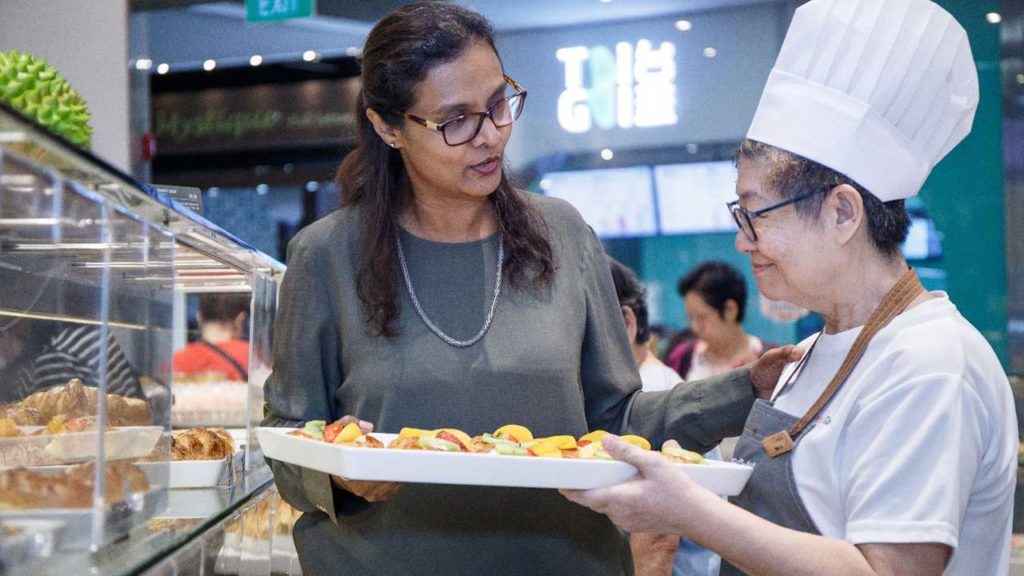
ABLE began with a vision that the physically challenged should not be left behind in society. That singular idea led to the founding of Abilities Beyond Limitations and Expectations (ABLE) in 2009 which sits under Caritas Singapore, the official social and community arm of the Catholic Church in Singapore.
A decade in, ABLE has empowered many with physical disabilities to live dignified, productive and independent lives through their signature Return-to-Work (RTW) programme.
“We customise our Return-To-Work programme based on the needs of each client, who may have acquired a disability resulting from conditions such as a stroke or traumatic brain injury,” said ABLE’s Rehabilitation Programme Manager, Carmen Lok.
Always looking to support efforts that enable those with disabilities, it was natural for Mediacorp Enable Fund (MEF) to support ABLE’s initiatives through a partnership with SG Enable. MEF supports some of ABLE’s employment support services, allowing the charity to help people with acquired disabilities return to work.
“The partnership is very important to us especially in our efforts to help those with disabilities who come from low-income backgrounds,” said Ms Lok.
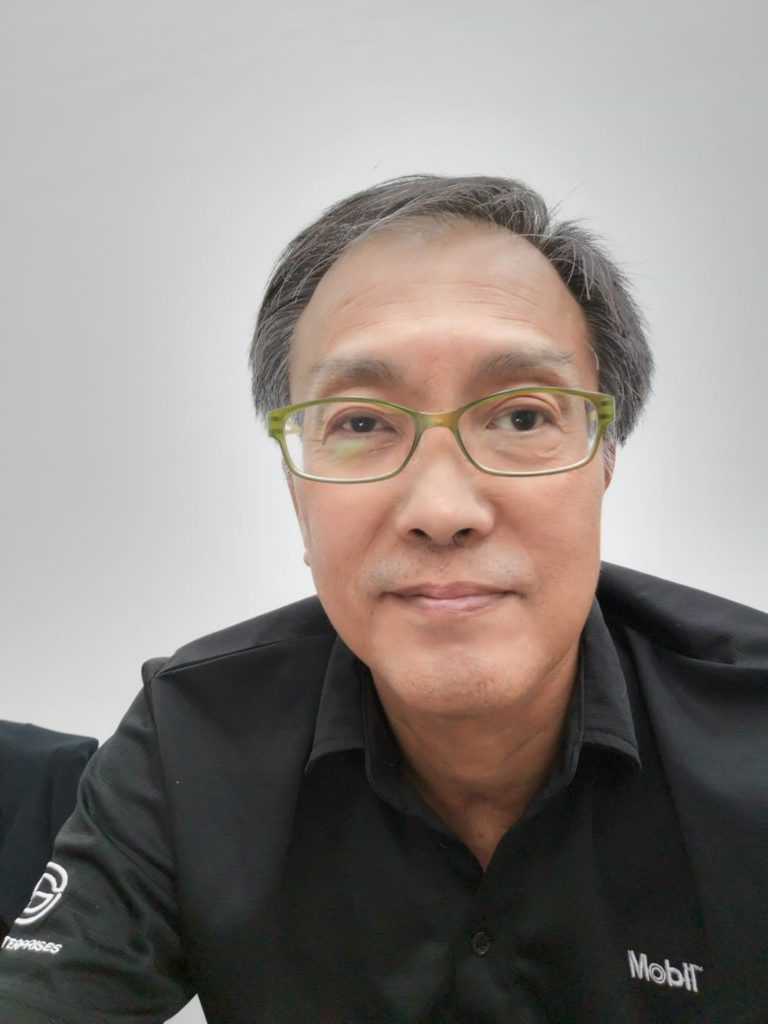
ABLE’s work may be targeted specifically at persons with disabilities, but for those it helps, ABLE is central to their sense of worth and well-being. Manfred Seah, 59, would certainly testify to this. Eight years ago, Mr Seah’s world fell apart because of a single, though deadly, bout of fever.
“I was on a business to trip to the US when I suddenly came down with a fever. I carried on with my activities as usual but after I returned to Singapore five days later, I had to be sent to the ICU. I was in a coma for one and a half months due to a viral infection,” recalled Mr Seah.
The virus attacked Mr Seah’s spinal cord and brain. By the time he woke up, Mr Seah could no longer walk and his left eye was affected. For a year, he was bed-ridden and had to undergo physiotherapy at home.
“After a while, I realised I couldn’t carry on like that. So, St Andrew’s Community Hospital, where I was undergoing physiotherapy, linked me up with ABLE in 2017.”
ABLE became integral to Mr Seah’s efforts to return to the workforce.
Mr Seah entered ABLE’s multi-disciplinary Rehabilitation and Training programme that includes rehabilitation, employment support, training and social work services. He started off with physiotherapy to improve his activities of daily living and increase his community mobility. Through employment support sessions, he explored potential job sectors, discovered what he wanted in his career and identified his training needs to achieve his career goal.
“I used to be the head of my company’s IT department, so I wanted to go back into something IT-related,” said Mr Seah.
ABLE’s Employment Support Specialist provided vocational counselling and helped him match his skills to available jobs and re-design his skill sets to increase his employability. When he was ready to go on a job hunt, ABLE was on hand to assist Mr Seah in the creation of a new resume and to approach employers.
“We have been fortunate enough to work with many inclusive employers willing to employ those with disabilities and give them a new lease of life. A common misconception employers have is that they would need to invest a huge amount of resources into accommodating employees with disabilities. However, this is often not the case. For example, it may be as simple as customizing the employee’s job tasks based on their strengths and abilities,” said Ms Lok.
Persons with disabilities face a variety of challenges when they seek employment. For example, some companies do not have group insurance that can cover the new hires with disabilities because of their pre-existing medical conditions. Others, like one employer who initially wanted to hire Mr Seah, do not have wheelchair-friendly offices.
“They wanted to hire me to teach English to their employees but their office didn’t have an elevator,” said Mr Seah.
In May 2018, a year after getting assistance from ABLE, he managed to secure a job as an IT system Advisor in an SME.
ABLE’s support does not end when its clients become employed.
“We offer post-employment support to help them transition back into the workforce,” said Ms Lok.
ABLE’s Employment Support Specialist visited Mr Seah’s workplace to better understand his work environment and provide accommodations advisory to Mr Seah’s employer if needed.
“This is so the newly employed can excel at their jobs,” said Ms Lok.
Life may not always be fair, but everyone deserves a fair chance. That is why ABLE strives to give everyone a success story like Mr Seah’s.

庆祝生日不忘做慈善!潮安会馆候任主席张学彬昨天(7日)庆祝46岁生日,特地举办一场盛大生日晚宴,为吴作栋协立慈善基金筹款,并邀得荣誉国务资政吴作栋担任主宾,整个晚宴总共为协立慈善基金筹得近250万元善款。 其中,吴作栋也捐出自己的手表和钢笔供竞标,两样物品最终以26万元的高价拍出,得标的是Epl Alliance Pte Ltd公司。 而印有吴作栋、社会及家庭发展部高级政务次长蔡瑞隆、国会议员陈佩玲、林谋泉和阀贺米的掌印纪念品,则拍得33万3333元3角3分的高价,由商人朱志强夫妇标得。 46岁的张学彬,是优联燃气控股的总裁,活跃于多个会馆社团。配合他的生日,他昨晚在醉花林俱乐部礼堂举办这场名为“实现梦想”(Enabling Dreams)的慈善晚宴。出席者除上述多个政要议员外、还包括企业家、商界领袖等“重量级”人物。 协立慈善基金至今发放逾500万元助残障人士 张学彬接受《8视界新闻网》访问时说,昨晚的晚宴对他来说,意义非凡。他说,其实庆生是次要,更重要的是想要做一场慈善筹款活动。 “我觉得,社会上还有一些不幸群体,需要我们去帮助。生日年年有,但不是说,年年都可以去办慈善活动。很幸运的,大家都很疼爱我,一叫就来了。” 张学彬说,昨晚筹到的所有善款,都将捐给吴作栋协立慈善基金,希望尽可能帮助到更多的有需要群体。 吴作栋在致辞时说,吴作栋协立慈善基金至今已发放超过500万元协助残障人士,他希望该基金是可持续性的,以便能继续为残障人士得生活带来积极得影响。 昨晚的庆生慈善活动,共进行长达四个小时,分别举行多场的慈善义标项目,在场的仁人善翁、商界人士都非常踊跃参与捐款,整个慈善晚宴最终共筹得243万8888元。 吴作栋协立慈善基金受惠者,昨晚在晚宴上也带来多项余兴节目,使得晚宴热闹精彩。 吴作栋协立慈善基金旨在为残障人士提供对社会做出贡献和融入社会的机会。基金由新协立管理,新传媒鼎力支持。荣誉国务资政吴作栋是基金的赞助人。欲通过吴作栋协立慈善基金给予残障人士支持, 请浏览 GCTEnableFund.sg。 文: 8 world 叶衍娴
Read More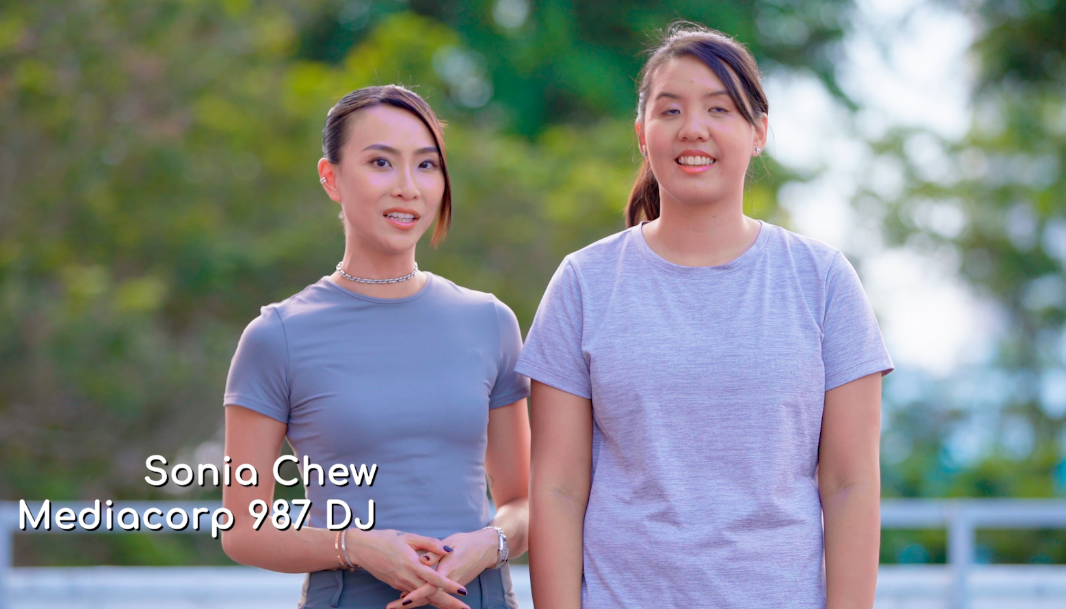
987 DJ Sonia Chew spent a day getting to know Joan Hung, a Goh Chok Tong Enable Awards 2021 Promise Awardee. Joan was born with visual impairment, but that has not stopped her from pursuing her passion for sports. She has represented Singapore in Goalball in the ASEAN Para Games in 2015 and 2022, […]
Read More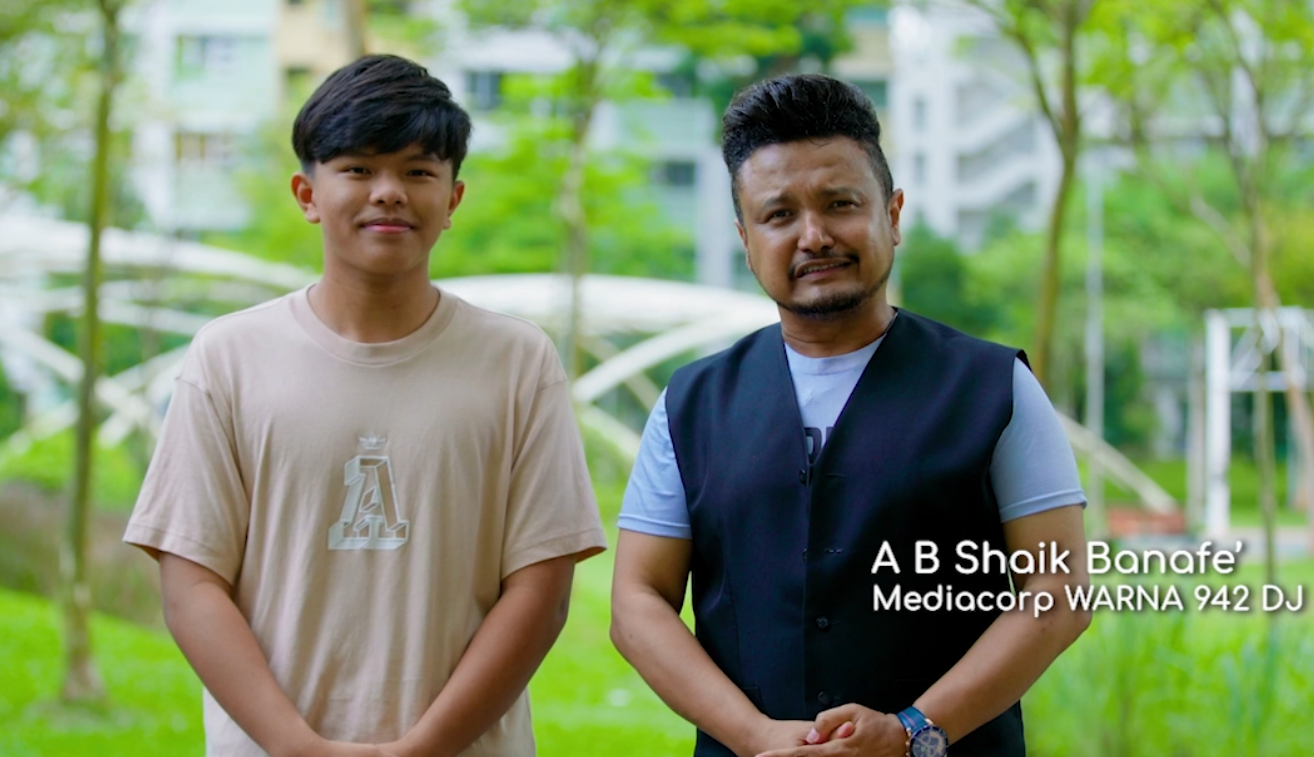
WARNA 942 DJ A B Shaik spent a day getting acquainted with Amirul Afiq, a beneficiary of the Goh Chok Tong Enable Fund. Amirul was born deaf, but he has never allowed his disability to deter him from living life to the fullest. The Fund aided Amirul in purchasing a cochlear implant, which allowed […]
Read More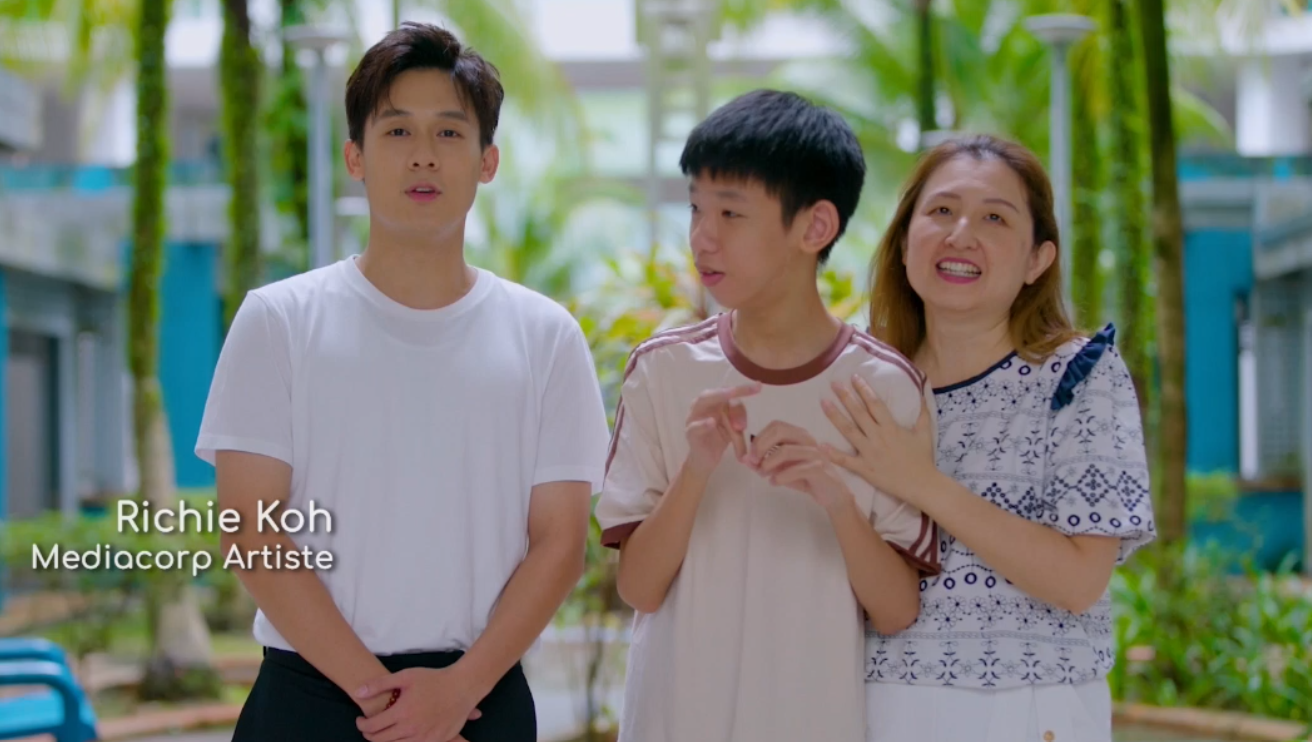
Richie Koh and Goh Chok Tong Enable Fund beneficiary Fengze spent the day together and bonded over their love for all things superheroes. Diagnosed with autism and Pierre Robin Syndrome, which causes breathing difficulties, Fengze is unable to communicate verbally and requires constant care and supervision from his parents to ensure his safety. You […]
Read More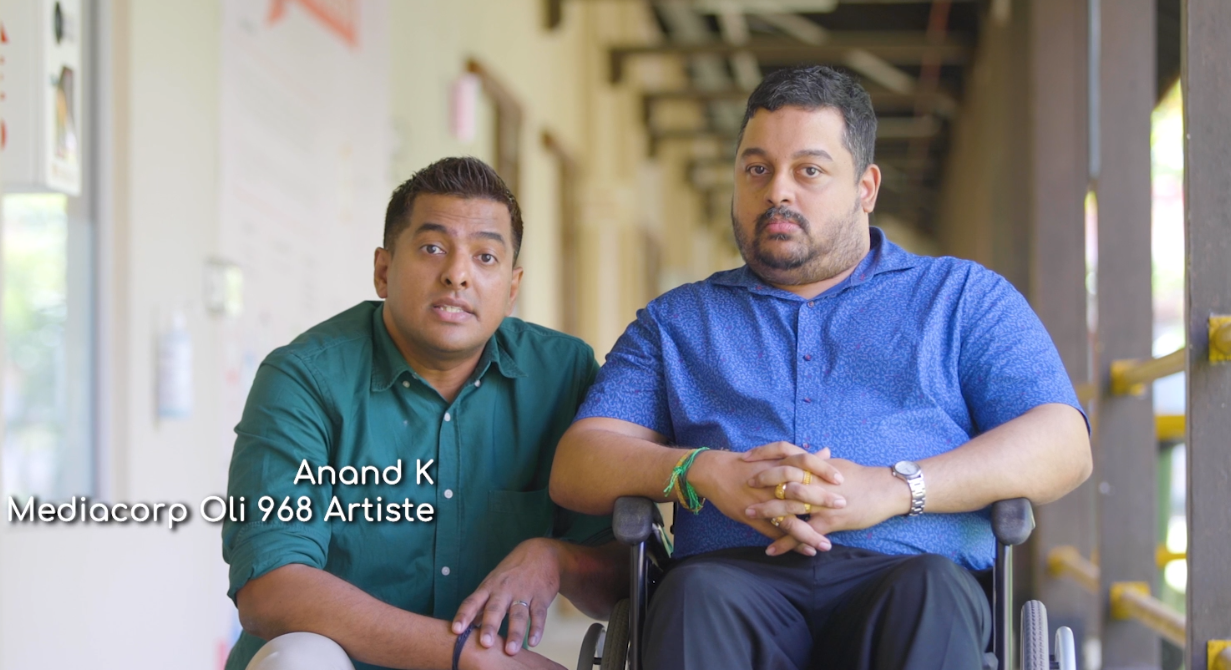
Oli 968 artiste Anand K spent a day with Dr Navin Nair, Goh Chok Tong Enable Awards 2022 Promise Awardee, who was diagnosed with cerebral palsy at birth. He became a force for good, working with the Land Transport Authority and SMRT in their efforts to support persons with disabilities in navigating the public […]
Read More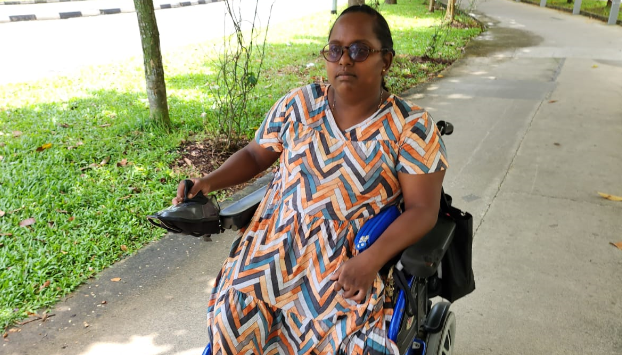
Weekends are always busy for 41-year-old Executive Assistant, Mary Sagaya; like most, she spends quality time with her family either visiting various parks or going shopping. It has been six years since Mary purchased her motorised wheelchair with aid from the Goh Chok Tong Enable Fund (GCTEF), which Mary shared, has allowed her to once […]
Read More